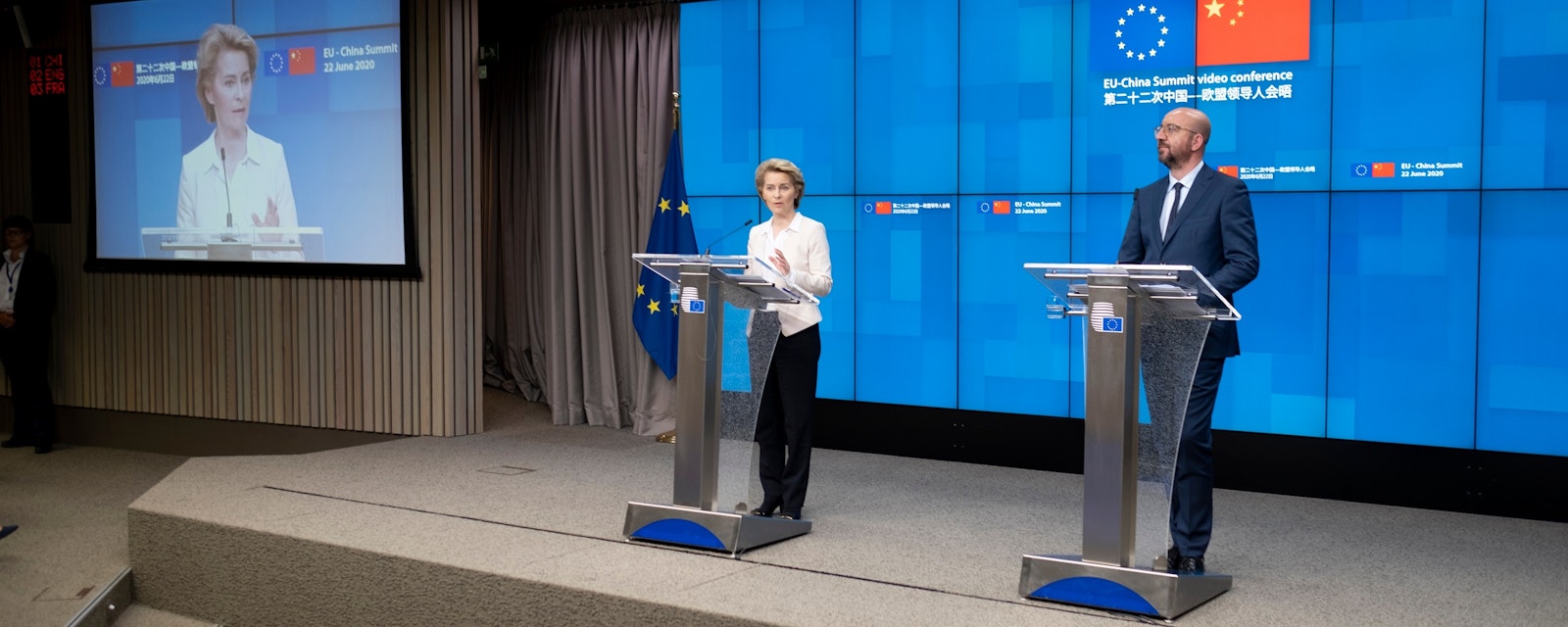EU and Chinese leaders met on 22 June for a virtual summit, characterised by EU efforts to put more pressure on its Asian rival. The EU took an assertive foreign policy stance by condemning cyber-attacks on EU hospitals and a Covid-19 disinformation campaign that the EU attributed to China.
The EU wants to agree on an investment treaty with China before the end of the year, and to reach that objective it recently launched new initiatives seeking deeper trade partnerships elsewhere in East Asia, and cracking down on Chinese subsidies that distort the EU market. China is still considered at once as a systemic rival, and an important economic partner, and the EU is concerned that the US approach to China is steering it in the wrong direction. EU member states are fully supporting the bloc’s stance, despite the recent Chinese attempts to woo Southern and Central European states with closer bilateral cooperation.
The EU-China summit in June
For the EU, 2020 was meant to be the year of China, with two summits between EU and Chinese leaders originally planned in March and October. However, the Covid-19 crisis changed the situation, both in political and practical terms.
The first summit was originally planned in March but was postponed for a videoconference on 22 June. This allowed EU institution leaders, the European Commission President Ursula von der Leyen, the High Representative for Foreign Affairs Josep Borrell and the President of the European Council Charles Michel, to talk to the Chinese Prime Minister Li Keqiang and the Chinese President Xi Jinping, remotely.
Von der Leyen used the summit to condemn China on events such as the recent cyber-attacks on EU hospitals that the EU’s foreign service has attributed to China, but which China has denied. The press conference that followed the meeting was also dominated by controversial themes, like disinformation and propaganda efforts around the Covid-19 outbreak attributed to China, China’s human rights record and the new national security legislation in Hong Kong. In contrast to last year, no common press release was issued after the meeting and the Chinese leaders did not participate in the press briefing. This shows the EU’s intension to play a more assertive role in foreign policy and underlines the fact that the EU still considers China as a ‘systemic rival’.
However, most of the discussions during the summit were concentrated on areas where China and the EU want to cooperate, such as on climate, nuclear non-proliferation (particularly regarding Iran), preserving the multilateral system of governance, and on bilateral trade, investment and scientific cooperation. These are matters where the EU seeks cooperation with China, in contrast with the US approach to decouple from China.
Indeed, the EU is increasingly worried about the US President Donald Trump’s cold-war rhetoric towards China, and the US pushing China towards managed trade, based on import and export targets, rather than the free trade model preferred by the EU.
The summit did not achieve tangible results in promoting the EU-China investment treaty, which was the original target milestone for the year. The October summit with the Chinese President Xi Jinping, originally planned in Germany, has been postponed. However, it is still the intention of the EU - and more precisely of the German Presidency of the Council of the EU – to hold the EU-China summit before the end of the year.
The EU’s Strategy Ahead
In the meantime, the EU is sharpening its arsenal of trade instruments. The European Commission has recently published a White Paper on foreign subsidies, which lays out a series of measures aiming to reduce the distortive effects on the Single Market caused by subsidies granted by non-EU governments to companies in the EU. The paper reflects the Commission’s ambition for the EU to become more assertive and less “naïve” on the international scene. The European Commission plans to introduce a proposal for a new legal instrument in 2021. These will give the European Commission greater power to police the foreign acquisition of EU companies in cases where the prospective buyer gets financial support from a foreign government, and to target state-subsidized foreign companies that operate in the EU with behavioural changes if they distort the EU’s single market. Foreign subsidies allowing companies to undercut European rivals in public procurement or for the grant of EU funding will also be tackled.
This European approach follows new takeover rules already implemented in several member states, such as Germany which is becoming stricter in screening foreign investments in strategic sectors. This new initiative aims at the same time to protect EU interests in general and to put pressure on China to negotiate a comprehensive investment agreement with the EU that would pre-empt the use of these instruments.
The EU’s more offensive trade agenda in Asia has the same purpose. The EU has concluded an ambitious free trade agreement with Vietnam, which will enter into force on 1 August, to promote trade and investment, including in sectors where China used to be the main market. This agreement will also provide the EU with alternative supply chains, from a country with lower production costs than China, including for more sophisticated products. The EU aims to conclude similar agreements with Indonesia and India at a later stage.
Member states are fully supporting the EU’s more assertive approach towards China, despite the recent Chinese attempts to attract the interest of Southern and Central European states with investments and high-profile delivery of ventilators and protective equipment during the Covid-19 crisis.





